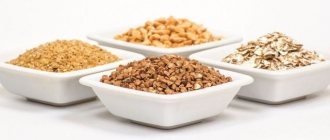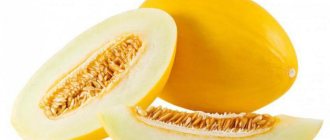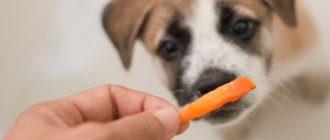Often, owners of four-legged animals humanize their pets too much, forgetting that in their desire to pamper the animal and express their feelings they can harm it. For example, not all owners ask the question “can dogs have sweets” and are happy to treat them with cookies, chocolate, candy or a piece of cake. If the owners do not do this, there are always friends and guests who are unable to resist the pleading gaze of the tailed cunning creatures and slowly feed them a tasty morsel, without thinking about the consequences. And they can be quite sad.
Is it possible to give a dog sugar?
First, you need to understand whether you can give your dog sugar, and what a sweet treat is for an animal. We usually classify sweets as sweets, cookies, marshmallows, marmalade, pies and cakes. But in fact, everything that contains refined sugar, even in small quantities, is sweet. Store-bought yoghurts, waffles, gingerbread cookies, crackers, white bread, buns, bagels and even honey can be classified in this category. Anything that contains fast carbohydrates in large quantities: pasta, sweet fruits (bananas, grapes in any form).
The animal’s body is completely unsuited to processing “artificial carbohydrates” and is unable to cope with them. After all, before dogs were domesticated by people, they didn’t eat sweets. In nature, it was quite difficult to obtain pure carbohydrates - bees do not just give up their product and sting painfully, and fruits grow high on trees. To the question “is it possible to give a dog sweets” there is only one answer - a categorical no!
In what form can dogs eat sweets?
Dried fruits and honey are suitable treats. Homemade apple juice can be given in small quantities, but only a little so as not to cause diarrhea. Bananas are perfectly accepted by the dog's body; there is nothing in them that provokes allergies; in addition, there is a lot of magnesium, which has a beneficial effect on the state of the nervous system.
Apple, pear, raspberries and blueberries, fresh or dried, are also suitable, especially if they are grown at home and not from the store. Carrots also contain a lot of sugar and have a sweetish taste, so your pet will also like them, but if you overdo them in the diet, you can cause diarrhea. If you want to treat your dog with something, it is better to buy special candies at the veterinary store.
Why is sugar so bad?
Many people know that carbohydrates are an important and necessary element for the body. It is carbohydrates that are converted into energy. That is, they are really needed of high quality and in reasonable quantities. What happens if they enter the body in excess?
Substances obtained with food undergo a process of processing from carbohydrates into glucose, then into glycogen. In the form of glycogen, carbohydrates are contained in small quantities in the liver, blood and muscles. Any physical activity allows you to spend them, and at the next meal you can restore the supply. If the amount of carbohydrates entering the body exceeds its energy needs, there is only one way out - to put them “in reserve,” that is, in the form of fat deposits. As a result - metabolic disorders, diseases of the endocrine system, and sudden weight gain. Obesity in dogs is a fairly common problem.
Another problem is the risk of developing allergic reactions and general intoxication of the body. When the liver and pancreas cannot cope with large amounts of carbohydrates, metabolic products appear. They can cause allergies and become toxins. Dogs with a predisposition to diabetes are at risk. Even if you give your dog small portions of sweets, the disease will not be long in coming.
Is it possible to give sweets to dogs if there is no cause for concern and no obvious symptoms of any disease? The insidiousness of sugar is that health problems do not begin immediately. The negative effects of sweets are cumulative, and their manifestation is often associated with other diseases or the presence of parasites in the body. It can easily be mistaken for flea dermatitis, fungal infections or a tick bite.
You may be wondering what cereals can be given to dogs.
Harmful sweets for dogs and puppies
But not only sugar is harmful; many sweet treats, for one reason or another, are not recommended for four-legged pets. The list of prohibited products includes the following:
- Chocolate. Theobromine, which saves humans from depression, is a real poison for dogs. This is due to the fact that the animal’s body is not able to remove this substance, and the component simply accumulates in the body. And in large quantities it becomes toxic. First of all, theobromine affects the central nervous system, the dog begins to behave inappropriately, then the heart muscle suffers. One tile of a quality product can kill an animal in 3-4 hours!
- Xylitol. This sweetener is a polyhydric alcohol found in most sweets. Chewing gum, which dogs often pick up on the street, is characterized by its high content.
- Grapes and raisins. A sweet fruit that is toxic to dogs; in addition, it can cause fermentation processes in the animal’s intestines.
- Sweet acorn. Not only pigs love this product, but also some dogs can pick up such a sweet treat from the ground. However, acorns contain gallotannin, a toxic substance used in medicine and industry not related to food production.
- Citrus. Although in most cases dogs themselves refuse such treats, there are exceptions. If your pet likes the treat, you should know that this group of fruits is a powerful allergen.
- Cherry, sweet cherry, persimmon. It is not the fruits themselves that cause harm, but their seeds, which can cause inflammation in the small intestine. And this, in turn, often leads to intestinal obstruction.
- Yeast dough. Sometimes people can eat raw dough, this happens when there is a deficiency of the components contained in the yeast. But it should not be given to dogs, as its swelling in the stomach can cause severe pain in the animal. In addition, yeast produces toxins that negatively affect the animal's body.
- Avocado. This exotic fruit is poorly tolerated by many pets, such as birds, horses, and rabbits. The fact is that avocados contain persin, a toxic component. And although dogs with its tolerance are better, the fruit can cause stomach upset.
In addition, this list can safely include products with flavors, dyes, emulsifiers and preservation components.
Symptoms of poisoning
Manifestations of a negative reaction to sweets in a dog can be observed as:
- Sour eyes in the morning and throughout the day;
- Increased secretion of earwax, unpleasant odor from the ears, redness and dryness of the skin of the auricle;
- The animal's fur becomes faded, becomes oily, and dandruff may appear;
- Rash, redness, small sores, especially noticeable on the stomach, chest and chin;
Monitor the dog's condition. Other diseases with similar symptoms cannot be excluded. But, when talking with a veterinarian, you must tell them that the dog ate sweets. This will save time on making the correct diagnosis and allow you to prescribe effective treatment as quickly as possible.
Why can't dogs have sweets? Veterinarian answers
As you understand during the feast, there will be a lot of guests, everyone will relax, and someone will definitely feed your dog something tasty. Or the dog itself will steal what it likes from the table, in a word, once a year there is a New Year. And then, most likely, there will be consequences.
What are sweets?
Why can't dogs have sweets? First, let's clarify what we mean by the word sweet? For example, we know that candy and honey are, of course, sweets, but we do not classify white bread and bagels as sweets.
But in fact, products such as ice cream, cake, bread and white bread crackers, cookies, bagels, pasta, yoghurt with added sugar, sugar, gingerbread cookies, muffins, waffles can negatively affect the animal’s health.
I think you understand my train of thought and can continue the list on your own. That is, all products containing a large amount of “fast” carbohydrates, foods with a high glycemic index. Those that, when digested, quickly increase the level of glucose in the blood, can all be called sweets.
Why are sweets harmful?
Carbohydrates are valuable substances for the body, they provide energy and take part in many processes. You definitely need carbohydrates. But animals in nature can rarely find carbohydrates in large quantities and in one place. And as you understand, candies do not grow on trees, they were invented by man.
Natural sweetness is honey and fruits, honey is difficult to obtain and is also protected by angry bees, and sweet fruits are rare. Therefore, the body of a cat or dog has not adapted to digest sugar concentrate. Friends, we are also not designed to digest sugar in large quantities, we can simply withstand more than our pets.
But let's return to our question - why can't dogs have sweets? All nutrients, including carbohydrates, which are abundant in sweets, enter the body with food. After digestion, the substances are absorbed in the intestines and sent to the liver through the blood.
The liver has many functions, one of them is processing carbohydrates. When glucose in the blood is already at a sufficient level, and it continues to flow, its excess is converted into glycogen.
Glycogen is also called animal starch; it is stored in reserve in the liver and muscles. With increased stress and lack of glucose, glycogen is converted back into glucose and thereby maintains energy levels.
Using reserves, the animal can go without food for some time and do active work using the accumulated glycogen.
Now imagine, the incoming carbohydrates must be stocked up, they don’t lie on the road, and when the next time there will be lunch, who knows. Therefore, if you regularly give an animal candy, some of the energy is spent, some is stored, but the capabilities of the digestive system have limits.
The liver and pancreas cannot process everything at once - metabolic products appear, to which the body reacts as if it were an allergen.
And when a dog already has a negative sensitivity to sweets, then a small piece of cookies or cake is enough for it to show symptoms, read about them below.
It’s interesting that the exacerbation (symptoms) does not go away for several weeks and you will already forget that you ever gave anything. Typically, in such cases, fungal infections of the ears, flea dermatitis, chicken allergies and other diseases can be treated. Yes, the dog may indeed have developed a fungus or mite, but a reaction to sweets must be ruled out.
Symptoms
If your dog reacts negatively to cookies and candies, then you will notice discharge from the eyes, as they are simply called - sour eyes. There will also be more earwax, you will feel an unpleasant, distinct odor from the ears, and you will see redness or dryness of the skin of the auricle. Itching will appear, the dog will scratch its ear with its paw or rub against furniture.
Dry skin in a dog's ear
By running your hand against the fur, you will notice dandruff, that the fur has become greasy and dull. Redness, peeling or ulcers will appear on the skin throughout the body. It is easier to find changes on the abdomen and chest, where there are exposed areas of skin.
Friends, there may be other symptoms, pay attention to any changes occurring in your animal.
Several cases from practice
For clarity, I will tell you a few cases, perhaps you will see yourself in them. I have friends, we’ve known each other for probably six years now, when they got a dog, that’s how we met. We often call each other and meet.
In general, the dog is in good health, but there is one problem - as soon as he eats a small piece of cookies, the next day his ears begin to run.
We talked with the dog's owner many times, I explained in every way that there is no need to do this, there is no need to give even a small crumb of sweets. He agrees and understands. But he says that he cannot resist these pleading looks and sometimes breaks down. And dogs are truly professional actors; they can pity even the most persistent and strong-willed person.
And the most interesting thing is that many owners do this, they understand that it is impossible, but they still give ice cream, candy or gingerbread. One small piece won’t do anything bad, we eat and everything is fine, but the dog also wants something tasty. I often hear something like this argument.
The second case is a collective image; there are owners who do not tell the whole truth. When you examine the animal, you see signs that the dog most likely has a sweet tooth. You ask, do you give me some rolls or gingerbread? No, only premium food and we have been eating it for a long time.
You begin to think, look for other possible reasons, but a child comes to the rescue and tells the whole truth. It turns out that mom likes to drink coffee and chocolate in the morning and shares a small piece with the dog. There are different versions of this story.
Treatment
- The treatment in this case is very simple - stop giving the dog sweets, even if she really asks, and after a few weeks the symptoms will go away on their own.
- In severe cases, when a dog develops other diseases due to prolonged consumption of sweets, for example, fungal skin infections, bacterial otitis media or another problem, then the cause must be determined and treatment prescribed.
- I repeat, not all diseases in dogs are caused by sweets, but if the symptoms that we talked about above appear, remember about cookies.
- Friends, feed your animals correctly, don’t give them sweets and you will be less friends with doctors.
- Veterinarian Sergey Savchenko was with you, see you again.
Why does a dog ask for sweets?
Owners often justify themselves by saying: “it’s impossible to refuse him, that’s the way he looks.” But the fault lies entirely with the owners. After all, it was you who encouraged the execution of the command with a piece of cookie, treated him with rich sweet cream from the cake, gave him candy so that the pet would leave the table. Each time, the dog developed abnormal eating behavior and a persistent attachment to sweets.
And every time you justified yourself that one piece would do nothing for your pet, or that occasionally you could still give your dog something sweet.
Why can't dogs have sweets?
No matter how close dogs are to humans, the physiology of four-legged animals is noticeably different from that of humans, therefore, nutrition is also different.
This must be remembered whenever a pet tries to beg sweets from its owners in various ways: it looks pitifully into the eyes, climbs on hands, licks hands and face, and uses various other tricks.
In this case, the owner usually thinks that nothing bad will happen just once, and hands his pet candy or cake. After a while, nothing really bad happens, and the dog gets a second helping of sweets and everything seems to be fine again.
Then doubt arises: what if all the stories about the dangers of sweets are just fiction. To answer the question whether dogs can have sweets, you need to understand the subtleties of the metabolic processes of our furry friends. This issue needs to be looked into in depth.
Sugar for dogs
Sugar-containing products are an attractive treat for many animals and seem to attract them like a magnet. Most owners reward their pets with sweets, not noticing how they get used to such treats. Over time, the dog will ask for more and more treats.
Imagine how much sugar a dog will receive during intense training, during which the owner can reward his pet up to 20 times or more. For example, 12 cubes of refined sugar is a large dose even for an adult man. This amount of sugar can lead to obesity.
In addition, the filtering systems in the animal's body will become overloaded, which will result in diabetes. It is important to understand that sweets are not the only way to reward your dog. There are many alternatives that can be used to encourage your pet to follow training commands.
Why shouldn't dogs be given sweets?
In fact, everything is simply explained: carbohydrate metabolism in the body of predators is much slower than that of humans. One of the most harmful sugar-containing foods is chocolate. It contains a substance such as theobromine. It has a stimulating effect on the human nervous system.
That is why chocolate can lift your spirits and relieve depression. Unlike the human body, the dog’s body is not able to get rid of the substance that is harmful to it - theobromine.
As a result, it accumulates in the pet's body in large quantities, causing a toxic effect on the animal's organs and tissues.
The greatest harm is caused to the nervous system - the dog becomes aggressive or, conversely, lethargic. The next blow is taken by the heart. Just 100 grams of any chocolate can seriously undermine your pet's health. The harm is that almost all sweets, even the highest quality ones, contain xylitol.
The substance is a polyhydric alcohol that acts as a sweetener. There is especially a lot of it in chewing gum, so it is necessary to wean your pet from picking up leftover food from the ground.
One way or another, the chemicals that are present in incredible quantities in almost any confectionery product, namely various additives, flavors, dyes, preservatives, are harmful to animals.
Why does a dog ask for sweets?
If your dog is constantly begging for sweets, then you need to pay special attention to his daily menu. There is a possibility that this behavior is not at all related to whims and taste preferences, but indicates problems with the animal’s health. The reasons may be the following:
- deficiency of essential vitamins and vital microelements;
- lack of carbohydrates (this can happen if the dog eats mainly meat);
- You taught your dog to eat sweets and suddenly stopped giving him treats.
Keep in mind that feeding sugary foods will not cure the problem. The pet needs to be given special food that contains naturally occurring sugars. This should be done in moderate doses, without abuse.
Harmful and healthy sweets for pets
The pet owner must know which sweets are strictly prohibited for his pet. But at the same time, keep in mind how you can pamper your pet and what sweet, tasty treats you can treat him to.
Harmful sweets
In addition to sugar itself, there is a whole list of various treats that should never be given to a dog. The list of prohibited products includes the following:
- chocolate, chocolate candies, etc. (as mentioned earlier, it contains a substance harmful to four-legged pets - theobromine. Find out in detail whether dogs can have chocolate.);
- xylitol (it was also discussed earlier: it is a sweetener that is found in almost all confectionery products);
- raisins and fresh grapes (for predators this fruit is toxic and, among other things, gives rise to a fermentation process in the intestinal tract);
- sweet acorn (it contains the toxic substance gallotannin, which is used in pharmaceuticals);
- citrus fruits (usually four-legged pets themselves refuse this product, but there are also exceptions; it is important to keep in mind that fruits belonging to this category cause a severe allergic reaction in dogs);
- persimmons, cherries, sweet cherries and other fruits with large seeds inside (once in the small intestine, these seeds provoke obstruction and internal inflammation);
- avocado (this exotic fruit contains persin, a substance that has a toxic effect on the body of domestic animals, including dogs; in the latter it causes stomach upset).
Healthy sweets for dogs
So is it still possible to give sweets to dogs? Despite the fact that products containing sugar are harmful to four-legged pets, some of them are still allowed for consumption. What vegetables and fruits can be given to dogs and what are their benefits? This list includes the following products:
- vegetables, in particular, such as: carrots, pumpkin, sweet potatoes, rutabaga, parsnips, beets (keep in mind that the latter has a laxative effect);
- bananas, this fruit is very good for health because it contains vitamins B and C, as well as potassium (consuming bananas in large quantities can cause constipation);
- apples contain useful elements, and due to their hardness and fibrous structure, they have a beneficial effect on the condition of teeth (before treating your dog with an apple, do not forget to remove the seeds from the fruit, cutting out the middle - the fact is that the core of apples contains cyanide in small doses, however, this may be enough to harm the animal);
- watermelons, melons, dogs really like melons, but it is better to give them in small portions and infrequently, because watermelon puts a lot of strain on the excretory system, including the kidneys, and melon is difficult to digest;
- honey - this product is rich in nutrients and vitamins; You can treat your dog with a treat, provided that the product does not cause allergies in the animal;
- nuts (pine, almonds), sesame, sunflower seeds, sprouted wheat seeds (oats); the latter is a rather sweet product and contains many useful elements; and yet you should not abuse such food, since sprouted grains can cause diarrhea in a dog; Also, do not forget that it is strictly forbidden to feed your pet a sweet acorn (despite the fact that it is a nut, it, as you remember, contains a dangerous substance - gallotannin).
Thus, we found out that dogs are prohibited from eating sweets, for what reason owners should limit their pets’ treats, and also what sweet foods are still allowed to be consumed.
It is very important that owners monitor their pets’ diet as closely as possible and in no case allow sugar-containing products in it, and also control the amount of sweets, which are allowed to be consumed occasionally and in small portions.
Can a dog have sweets? What harm can candy do? Link to main publication
How to replace sweets
Can dogs be given sweets in any other form? Is there an alternative to sugar, how to make your pet’s diet correct and balanced, but at the same time be able to pamper him with something tasty?
Manufacturers of food and pet products are well aware of the problem and the challenge facing them. The industry offers a huge range of treats for dogs that can replace harmful sweets and develop new, good and correct eating habits:
- Biscuits with the flavors of your favorite delicacies (chocolate, yogurt) will replace sweet pies and cakes. Suitable as a treat after unloved procedures (brushing teeth, ears, trimming nails, etc.);
- Croquettes, cookies - suitable as rewards during walks and activities;
- By-products, dried ears, sinews, tripe, tails are given to the dog to distract them from the table while people are eating. In addition, such treats help maintain healthy teeth.
What products are considered sweets?
Before answering the question of whether dogs can be given sweets, you should understand what food falls into this category. Sweets are high-calorie foods with a high sugar content, which is a simple (quickly digestible) carbohydrate. These are sweets, chocolate, cookies, cakes, ice cream, buns, etc. Confectionery products have a high glycemic index and in the process of assimilation increase the level of glucose in the blood of humans and animals. Bakery products made from wheat flour (white bread, crackers), honey and sweet fruits also have similar properties. They are also on the list of prohibited foods for dogs.
Food high in simple carbohydrates in large quantities is harmful to humans (especially in the presence of diabetes mellitus and other metabolic disorders), and in animals it can provoke serious pathologies. Under natural conditions, dogs and cats are carnivores and practically do not eat sweets (in rare exceptions, they may eat honey or fruit). Therefore, nature does not provide for their digestive system to digest such food.
Strictly prohibited
There are sweets that are especially harmful to dogs - for example, ice cream. It is a combination of milk, fats and sugar. This is a huge burden for a pet’s body, especially a small breed. At best, the animal will suffer from indigestion, diarrhea and the difficulties described above.
Flour confectionery products - white flour and sugar are a very harmful combination not only for dogs, but also for people. Their use should not be limited, but completely excluded from the animal’s diet. Grapes and raisins are record holders for sugar content. It is strongly not recommended to give them to your dog.
It is strictly forbidden to give your dog chocolate. This seemingly simple treat can become deadly for your pet. You can read more about this in the article “Can a dog have chocolate?”
Is sugar bad or good for dogs?
Refined sugar, familiar to humans, is contraindicated for carnivores, unlike herbivores. For those who chew grass, the fermentation caused by sugar does not interfere, but helps: this is how coarse vegetation (grass and grains) is digested and absorbed faster.
The digestive tract of predators, which includes dogs, is structured completely differently - in its stomach, sweetened foods begin to ferment, causing digestive disorders and disruptions in the functioning of important organs.
Excessive consumption of sweets leads to the following ailments:
- metabolic diseases;
- liver diseases;
- diabetes mellitus;
- digestive problems (symptoms: nausea, constipation, diarrhea, flatulence, vomiting and dizziness);
- allergies, ulcers and dermatitis (with hair loss);
- eye inflammation and lacrimation;
- hearing loss.
Important! In addition, sugar is harmful to a dog's teeth and gums. If you frequently feed your dog soft cookies/sweets, he will forget how to tear meat and chew bones: his teeth will hurt and fall out, and his gums will weaken.
If you do not want your dog to switch to kefir and porridge in its prime, do not indulge it with sweets and periodically brush its teeth (with a special brush and paste).
Return to content











